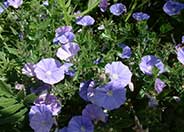Hotlinks:
| Designer: Green Goddess Gardens | Ebullient Shrubs |
Photographer: GardenSoft |
Soils and Compost:
Incorporate compost 6" into your soil to retain water, reduce compaction, feed earthworms, and provide valuable nutrients to your plants.
Water Saving Tip:
Integrated Pest Management:
Remove irrigation water and fertilizer from areas where you don't want weeds to grow.







